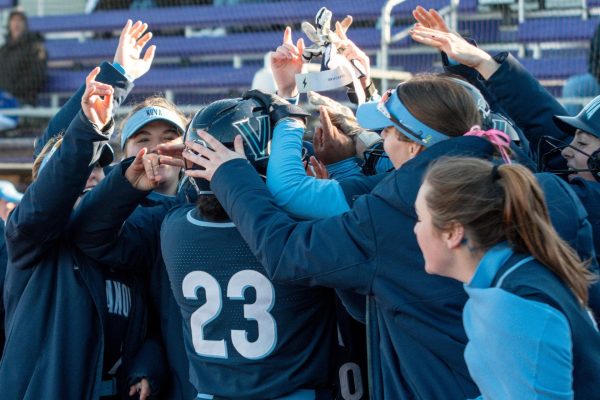Meet Thomas Monahan, Dean of C&F
August 30, 2002
“It’s all about the students.”
That’s what Thomas Monahan said when asked about his vision as dean of the College of Commerce and Finance. This simple yet powerful focus on student needs has guided him from his first faculty position at LaSalle, through his tenure as dean at Villanova, to his latest decision to return to teaching after this year. “Whatever we do in C&F,” Monahan says, is always “all about the students.”
And it shows. The college’s concern for students motivated the renovations to Bartley Hall, initiation of two new master’s programs and the hiring of many nationally prominent faculty members. Villanova’s business school has stepped up onto the national stage during his six-year tenure as dean, and Monahan believes this is a credit to the commited faculty and staff of the college.
Monahan also believes that the collegial culture of Villanova makes it easy to lead. His first love was teaching undergraduates. As he moved from teaching to administrative leadership, he kept his focus on the people in the classrooms, and his guidance of the entire college ultimately helped thousands of those students in some way.
What’s behind this story of successful leadership? Dean Monahan’s life experiences shaped his approach to education.
By age 26, just three years out of graduate school, Monahan had a responsible position in the Treasurer’s Department at Becton, Dickinson & Company. Monahan says he worked hard, worked aggressively, and loved his job. He was offered another promotion and considered a move to the firm’s Wall Street office. That was, until he made a decision that took him down a road less traveled.
He followed his heart and instead accepted a teaching position at LaSalle University.
“It was something you never do in industry,” admited Monahan. With a wife and child to support, Monahan decided to take a 50 percent pay cut. He was passing up a world of opportunity in New York. He gave Becton, Dickinson & Co. seven-months notice, but knew he risked being fired before he finished out those last few months. He also knew he might be disappointing the mentors and managers who supported him on his climb to success.
Monahan listened to his heart instead of his doubters. He says this wasn’t easy, since two of his greatest role models-a veteran treasurer and his own father-felt he was making a huge mistake.
“I enjoyed industry,” says Monahan, “but that experience confirmed in my mind that there is a different path that might work out better.”
“I believe there are many windows of opportunity,” Monahan says. “You have to be open to them when they come.” Monahan’s decision to teach rather than accept an exciting corporate job required a leap of faith. He believes that you cannot lose as long as you have an open mind.
“A lot of us, particularly when we’re young, put pressure on ourselves and think that if things don’t work out, we are losing our only chance,” Monahan explains.
“But you don’t only get one chance; you get a number of chances as long as you develop an attitude of being open to new things. Think about any opportunities that open to you, and take advantage of them.”
Monahan learned never to close his mind to anything. He says that narrowing your options to only investment banking, for instance, will limit your potential for success. Not considering other opportunities, such as sales or consulting, will put you at a disadvantage.
“I’ve had some things come up in my life that I thought would not work,” Monahan recalls. “But I listened, eventually saw them as possibilities, and pursued them. I didn’t get into consulting right away. At first, I was closed off to it. Then I realized I could balance it with teaching and research and it turned out to be a very good experience.”
The dean has consulted with more than 30 Fortune 500 companies over the past ten years. Consulting has taken him all over the United States, Europe and Asia, and led him to clients such as Accenture, ARAMARK, Deloitte, Ecolab, 3M, Philips Electronics N.V., and Rockwell International.
Monahan remembers playing quarterback on Hofstra’s football team as an experience that helped cultivate his leadership ability. He was also interested in studying economic theory, looking at the difficult issues and trying to give them structure. Monahan stressed the importance of taking academic experiences and building on them through extracurricular activities.
“I think it’s important to balance your life and learn from different experiences you have,” he says. “The classroom is unbelievably important in the college environment, and so are the other activities you’re involved with.”










